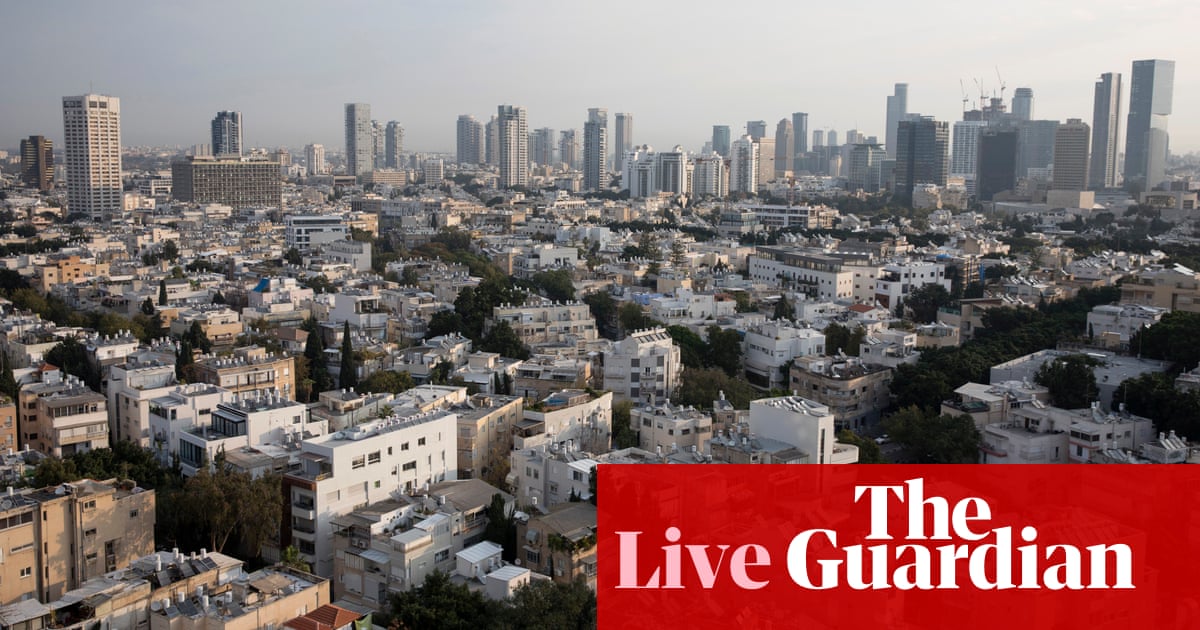Air raid sirens sound in Tel Aviv after Hezbollah claims to have targeted Israeli city
Air raid sirens sounded in Tel Aviv on Tuesday after Hezbollah said it bombed the Nirit area in the city’s suburbs with missiles.
The Israeli military said about 20 rockets were fired in the latest barrage from Lebanon – five toward central Israel and 15 toward the north, and that attempts were made to intercept them. The IDF said there were no immediate reports of injuries.
Interceptor fragments fell in the northern Israeli town of Ma’agan Michael, causing damage to a building as well as vehicles, Israeli media reported, citing police.
Hezbollah said it targeted the Glilot base of the military intelligence unit 8200 located in the suburbs of Tel Aviv with a missile salvo. It also said it targeted a naval base near Haifa. Hezbollah also said it launched a “salvo of rockets” targeting the “Stella Maris naval base northwest of Haifa”, a coastal city in northern Israel.
Videos verified by Al Jazeera’s Sanad agency showed smoke rising near the Beit Aryeh settlement located north of the occupied West Bank and east of Tel Aviv after sirens sounded in three settlements in the West Bank.
Key events
Lebanese state media reported Israeli airstrikes near the southern Lebanese city of Tyre after Israel’s military issued an evacuation call.
AFPTV footage captured smoke billowing after the Israeli militar warned residents of al-Haush, just south of Tyre, to evacuate, while Lebanon’s official national news agency reported that “enemy aircraft launched a series of strikes” that targeted the area.
Israeli forces have detained at least 28 Palestinians across the occupied West Bank, the Palestinian Prisoners’ Society and the Commission of Detainees and Ex-Detainees Affairs said.
According to Wafa, the Palestinian news agency, the detentions were carried out in al-Arroub camp, north of Hebron, which affected 15 citizens, while the rest were in the areas of Ramallah, Salfit, Bethlehem, Nablus and Qalqilya.
These detentions were accompanied by widespread raids, assaults, threats against detainees and their families and the destruction of homes, Wafa reported.
It is estimated that over 11,300 Palestinians have been arrested in the occupied West Bank and East Jerusalem since last October.
Human rights groups and international organisations have alleged widespread abuse of inmates detained by Israel in raids in the West Bank.
They have described alleged abusive and humiliating treatment, including holding blindfolded and handcuffed detainees in cramped cages as well as beatings, intimidation and harassment.
The Israeli army has issued an evacuation order for residents of al-Haush in southern Lebanon.
In a post on X, he wrote:
The IDF is operating within your town and has no intention of harming you. For your own safety, you must immediately evacuate your homes and move at least one kilometer outside the town.
Anyone who is near Hezbollah elements, facilities, and combat equipment is putting his life in danger.
#عاجل ‼️ انذار عاجل إلى سكان منطقة الحوش في جنوب لبنان
🔸جيش الدفاع بصدد العمل داخل بلدتكم ولا ينوي المساس بكم. من أجل سلامتكم عليكم اخلاء منازلكم فورًا والتوجه خارج البلدة لمسافة لا تقل عن كيلومتر واحد عنها.
🔸كل من يتواجد بالقرب من عناصر حزب الله ومنشآته ووسائله القتالية… pic.twitter.com/GMd7ixVo9S
— افيخاي ادرعي (@AvichayAdraee) October 22, 2024
More than 1.2 million residents have been displaced by Israeli attacks in Lebanon, with over a quarter of the country under evacuation orders.
Israel says its war goals in Lebanon include trying to degrade Hezbollah and return northern residents who were evacuated due to attacks by the Iran-backed militant group.
Death toll in Gaza reaches 42,718, says health ministry
At least 42,718 Palestinian people have been killed and 100,282 injured in Israeli airstrikes on Gaza since 7 October 2023, the Gaza health ministry said in a statement on Tuesday.
Of those, 115 Palestinians were killed and 487 others injured in the latest 24-hour reporting period, according to the ministry, which has said in the past that thousands of other dead people are most likely lost in the rubble of the territory.
Airlines that have suspended flights as Middle East tensions rise
As Israel continues its war in Gaza and assault on Lebanon, a growing number of international airlines are suspending flights to the region or to avoid affected airspace.
Reuters has helpfully compiled a list of some of them:
-
Aegean Airlines: The Greek airline cancelled flights to and from Beirut until 6 November and to and from Tel Aviv until 5 November.
-
AirBaltic: Latvia’s airBaltic cancelled flights to and from Tel Aviv until 30 November.
-
Air Algerie: The Algerian airline suspended flights to and from Lebanon until further notice.
-
Air France-KLM: Air France extended its suspension of Paris-Tel Aviv flights until 29 October and Paris-Beirut flights until 30 November. KLM extended the suspension of flights to Tel Aviv until the end of this year at least.
-
Air India: The Indian flag carrier suspended flights to and from Tel Aviv until further notice.
-
Bulgaria Air: The Bulgarian carrier cancelled flights to and from Israel until 31 October.
Cathay Pacific: Hong Kong-based Cathay Pacific cancelled flights to Tel Aviv until 25 October 2025. -
Delta Air Lines: The US carrier paused flights between New York and Tel Aviv through March 2025.
-
EasyJet: The UK budget airline stopped flying to and from Tel Aviv in April and will resume flights on 30 March.
-
Egyptair: The Egyptian carrier in September said it had suspended flights to Beirut until “the situation stabilises”.
-
Emirates UAE’s state-owned airline cancelled flights to Beirut through to 31 October and flights to Baghdad and Tehran until 30 October.
-
Ethiopian Airlines: The Ethiopian carrier suspended flights to Beirut until further notice, it said in a Facebook post on 4 October.
-
FlyDubai: The Emirati airline suspended Dubai-Beirut flights until 31 October.
-
Iran Air: The Iranian airline cancelled Beirut flights until further notice.
-
Iraqi Airways: The Iraqi national carrier suspended flights to Beirut until further notice.
-
ITA Airways: The Italian carrier extended the suspension of Tel Aviv flights through to 30 November.
-
LOT: The Polish flag carrier cancelled flights to Tel Aviv until 26 October. Its first scheduled flight to Beirut is planned for 1 April.
-
Lufthansa Group: The German airline group extended the suspension of flights to Tel Aviv until 10 November, while its low cost carrier Eurowings suspended them until 30 November. Flights for Tehran are cancelled until 31 October and to Beirut until 30 November.
-
Pegasus: The Turkish airline cancelled flights to Beirut until 28 October.
-
Qatar airways: The Qatari airline temporarily suspended flights to and from Iraq, Iran and Lebanon, while flights to Amman will operate only during daylight hours.
Ryanair: Europe’s biggest budget airline cancelled flights to and from Tel Aviv until the end of December. Group CEO Michael O’Leary said in early October that the suspension was likely to be extended until end-March. -
Tarom: Romania’s flag carrier extended the suspension of Beirut flights until 15 November.
United Airlines: The Chicago-based airline suspended flights to Tel Aviv for the foreseeable future.
Virgin Atlantic: The UK carrier extended suspension of Tel Aviv flights until end-March. -
Wizz Air: The Hungary-based airline suspended Tel Aviv flights through 14 January.
Israeli jets hit a Hezbollah target close to the Rafik Hariri university hospital in Beirut last night but did not target the hospital, which was not affected by the strike, according to the Israeli military (see post at 09.10 for more details).
Officials raise death toll to 13 killed in Israel airstrike near Beirut hospital
At least 13 people were killed and 57 others injured in an Israeli airstrike on Monday near Hariri hospital, Beirut’s main government hospital, the health ministry said, revising upwards its initial death toll of four (see opening summary for more details).
Another 57 people were injured in the strike near Lebanon’s biggest public hospital, located a few kilometres from the city centre, the health ministry said.
Iran’s foreign minister, Abbas Araghchi, is holding a press conference in Kuwait. We will give you more lines from it as they come in. Araghchi was asked about the expected Israeli response to the 1 October Iranian missile attack.
He said:
All our neighbours have assured us that they won’t allow their soil or airspace to be used against the Islamic Republic of Iran.
The comments come after Gulf Arab states reassured Iran of their neutrality in the escalating conflict between Tehran and Israel.
An official told Agence France-Presse (AFP) that Antony Blinken also plans to speak to Israeli leaders about the expected military strike on Iran and discourage any move that could massively escalate regional conflict.
The region is on high alert as it braces for Israel to respond to the 1 October missile attack on the country (you can read more about what happened here).
It is not clear yet how Israel will respond to Tehran’s ballistic missile attack. The US president, Joe Biden, has cautioned against striking Iranian oil facilities (after he had suggested Washington was “discussing” such action). Some of the other targets Israel could try to strike are Iran’s cluster of missile and drone bases, its economic infrastructure or its oil terminals.
US secretary of state lands in Tel Aviv for talks with Israeli leaders
The US secretary of state, Antony Blinken, has arrived in Tel Aviv for his eleventh trip to the Middle East since the war on Gaza was launched by Israel last October, following the Hamas-led 7 October attack. Blinken, starting his regional tour exactly two weeks before US presidential election, will meet Israeli prime minister Benjamin Netanyahu. American officials are hopeful for progress but downplaying chances of an immediate breakthrough for a Gaza ceasefire during his trip.
US Secretary of State Antony Blinken meets Israeli PM Benjamin Netanyahu to discuss diplomatic path for ceasefire deal in Gaza. Mohammad Al-Kassim has more from occupied East Jerusalem pic.twitter.com/KeoDF6GXQT
— TRT World Now (@TRTWorldNow) October 22, 2024
Blinken is expected to stress the need for Israel to allow more humanitarian aid into Gaza and to discuss securing the release of the remaining Israeli hostages in Gaza.
Blinken and Lloyd Austin, the defence secretary, warned in a joint letter last week that Israel could face consequences – including the potential blocking of future weapons transfers – if it did not take immediate steps to allow aid into the Strip within the next month.
The US, Israel’s most powerful ally and weapons supplier, has sent Israel more than 10,000 highly destructive 2,000-pound bombs and thousands of Hellfire missiles since the start of its war on Gaza, in which over 42,000 Palestinians have been killed by the Israeli military so far.
The US military has rushed its advanced anti-missile system (called the Terminal High Altitude Area Defence system or THAAD) to Israel and it is now “in place”, defence secretary Lloyd Austin said yesterday.

Robert Tait
Robert Tait is a journalist based in Washington DC
An Israeli military unit that has been accused of human rights abuses against Palestinian detainees is reportedly under investigation by the US state department in a move that could lead to it being barred from receiving assistance.
The inquiry into the activities of Force 100 was instigated following a spate of allegations that Palestinians held under its guard at a detention centre have been subject to torture and brutal mistreatment, including sexual assault, Axios reported on Monday.
The investigation – a rare occurrence on the part of the US with regard to Israel – could result in the unit being penalised under a landmark peace of legislation known as the Leahy law, which prohibits the state and defence departments from rendering assistance to foreign security force units facing credible accusations of human rights abuses.
Nine members of Force 100, a unit inside the Israel Defense Forces, are the subject of criminal investigation over allegations that they sexually assaulted a prisoner at the Sde Teiman detention camp in the Negev desert, which human rights groups have dubbed “the Israeli Guantanamo”.
You can read the full story here:
Women and children were among the 15 Palestinian people who have been killed in an Israeli drone strike in the town of Beit Lahiya in northern Gaza, Wafa, the Palestinian news agency, reported, citing the Red Crescent and medical sources.
The entirety of northern Gaza is under Israeli evacuation orders to flee south, even though there is nowhere safe for people to go. The Israeli military launched an intense assault in northern Gaza on 6 October, claiming it was trying to stop Hamas fighters from regrouping. But many civilians have been killed in the attacks, with residents saying Israeli forces besieged hospitals and shelters for displaced people and targeted residential areas.
Air raid sirens sound in Tel Aviv after Hezbollah claims to have targeted Israeli city
Air raid sirens sounded in Tel Aviv on Tuesday after Hezbollah said it bombed the Nirit area in the city’s suburbs with missiles.
The Israeli military said about 20 rockets were fired in the latest barrage from Lebanon – five toward central Israel and 15 toward the north, and that attempts were made to intercept them. The IDF said there were no immediate reports of injuries.
Interceptor fragments fell in the northern Israeli town of Ma’agan Michael, causing damage to a building as well as vehicles, Israeli media reported, citing police.
Hezbollah said it targeted the Glilot base of the military intelligence unit 8200 located in the suburbs of Tel Aviv with a missile salvo. It also said it targeted a naval base near Haifa. Hezbollah also said it launched a “salvo of rockets” targeting the “Stella Maris naval base northwest of Haifa”, a coastal city in northern Israel.
Videos verified by Al Jazeera’s Sanad agency showed smoke rising near the Beit Aryeh settlement located north of the occupied West Bank and east of Tel Aviv after sirens sounded in three settlements in the West Bank.
Opening summary
Hello and welcome to the Guardian’s live coverage of Israel’s wars on Gaza and Lebanon.
Air raid sirens sounded in Tel Aviv on Tuesday after Hezbollah, the Lebanese militant group, said it bombed the Nirit area in the city’s suburbs with missiles.
The Israeli military said about 20 rockets were fired in the latest barrage from Lebanon – five toward central Israel and 15 toward the north, and that attempts were made to intercept them. Police added that there are reports of interceptor fragments falling in the Tel Aviv area. Israeli media said there were no immediate reports of injuries.
It comes as Antony Blinken is due to arrive in Israel on Tuesday, on the first stop of a wider Middle East tour aimed at jumpstarting Gaza ceasefire talks after the death of Hamas leader Yahya Sinwar last week.
Blinken will also discuss with Israel and other countries how to secure a diplomatic resolution to the conflict with Hezbollah, and continue Washington’s conversation with the Israelis about their expected response to Iran’s missile attack, according to reports.
In Lebanon, Israel rained more than a dozen strikes Monday night on Beirut’s southern suburbs. It was the second night in a row that Beirut was heavily bombed, with Israel carrying out more than 15 airstrikes on Hezbollah-linked banking institutions the night before. While most districts of Beirut’s southern suburbs had been emptied for almost a month, at least three of Monday’s strikes hit the densely packed residential area of Ouzai that was still filled with people because it had not been previously targeted before.
At least four people were killed, including a child, and 24 were injured when one of the Israeli airstrikes hit just in front of the entrance of the Rafik Hariri university hospital, the largest public hospital in Lebanon.
Israel’s military spokesperson said a bunker containing “millions of dollars in gold and cash” was located directly under the Sahel hospital, serving as a central financial facility for Hezbollah, and adding that it had also been previously used as a hideout for the former Hezbollah leader, Hassan Nasrallah. Daniel Hagari, the IDF spokesperson, did not provide evidence but instead showed animated graphics that purported to show a bunker under the hospital.
Fadi Alame, the hospital’s director who is also a Lebanese lawmaker, said Israel’s allegations were baseless.
“The hospital has operation rooms, there are no tunnels, no bunkers. This is all pure imagination,” Alame told CNN, while inviting the Lebanese army, the UN and journalists to inspect the hospital themselves to disprove the Israeli statements.
In other developments:
-
Israel said late Monday it planned to carry out more strikes in Lebanon against a Hezbollah-run financial institution that it targeted the night before and which it says uses customers’ deposits to finance attacks against Israel. At least 15 branches of Al-Qard Al-Hasan were hit late Sunday in the southern neighbourhoods of Beirut, across southern Lebanon and in the eastern Bekaa valley, where Hezbollah has a strong presence. One strike flattened a nine-story building in Beirut with a branch inside it.
-
There were reports that dozens of Palestinians, including children, were killed in attacks carried out by Israeli soldiers in the northern Gaza Strip. Among the casualties were at least 10 people killed in an Israeli attack on Jabalia Preparatory School in Al-Fawqa area, which was functioning as an Unrwa shelter for displaced people, Palestinian news agency Wafa reported.
-
Joe Biden’s administration remains “deeply concerned” about the leak of a pair of highly classified intelligence documents describing Israel’s preparations for a retaliatory strike on Iran, the White House has said. There is no indication that additional documents have been compromised and US officials have been in communication with Israeli counterparts about the leak, a spokesperson said.
-
Iran warned the US would bear “full responsibility” in case of a retaliatory attack by Israel on the Islamic Republic, after US president Joe Biden indicated he was aware of Israeli plans to do so. Amir Saeid Iravani, Iran’s ambassador to the United Nations, called Biden’s remarks “profoundly alarming and provocative”.
-
The UN warned Monday that almost no aid is entering the besieged Jabalia refugee camp in northern Gaza, where a two-week Israeli military campaign has killed hundreds of people and left thousands trapped.
-
The heads of the United Nations World Food Programme and UN children’s agency Unicef, Catherine Russell and Cindy McCain, have privately appealed to Israeli prime minister Benjamin Netanyahu for help “alleviating the suffering of countless civilians” in Gaza, the West Bank and Lebanon, according to a new letter.
-
Up to 1,000 women and children needing medical care will shortly be evacuated from Gaza to Europe, the head of the World Health Organization’s Europe branch said. Israel, which is besieging the war-devastated Palestinian territory, “is committed to 1,000 more medical evacuations within the next months to the European Union,” Hans Kluge said.
-
The US military has rushed its advanced anti-missile system to Israel and it is now “in place”, defence secretary Lloyd Austin said. THAAD, or the Terminal High Altitude Area Defense system, is a critical part of the US military’s layered air defence systems and adds to Israel’s already formidable anti-missile defences.



